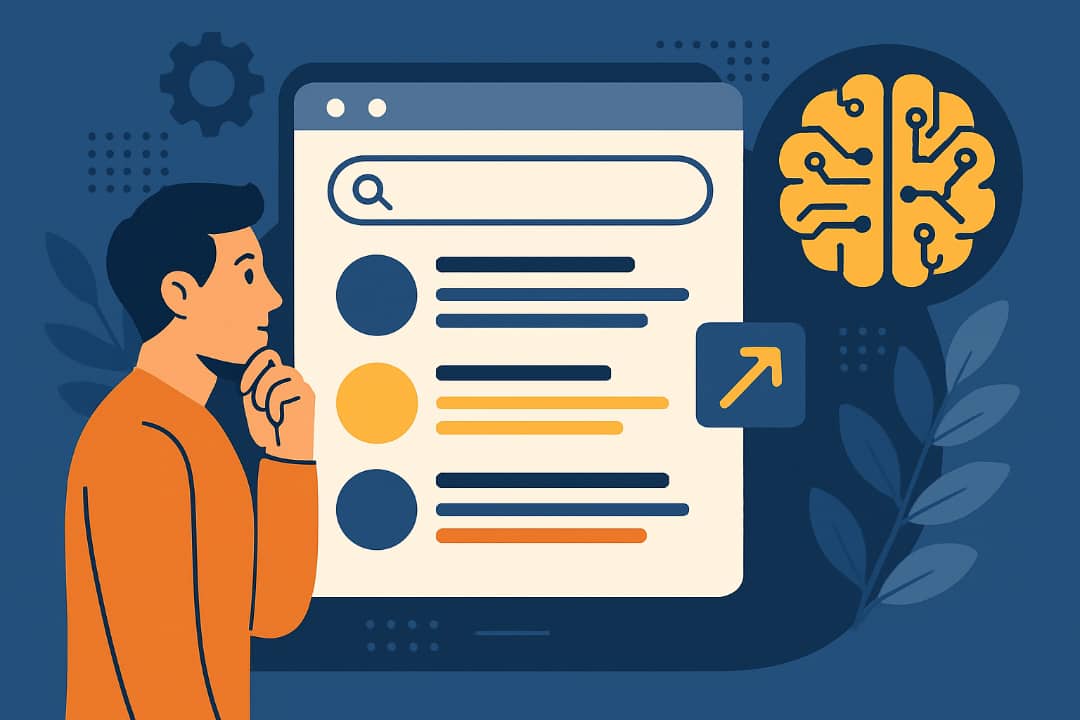Content optimization can feel like running a never-ending marathon. There are titles to tweak, descriptions to rewrite, and endless on-page SEO improvements to make.
Now, imagine having an intelligent assistant who works around the clock, offering innovative suggestions, automating tedious tasks, and helping you identify gaps in your content strategy in real time.
That’s the power of AI content optimization.
In this post, we’ll show you how to harness AI to streamline your workflow, boost efficiency, and create better, more competitive content faster than ever.
What is AI Content Optimization?
AI content optimization is the process of using artificial intelligence to improve the quality and relevance of your content.
It includes everything from analyzing keywords and suggesting internal links to enhancing clarity and recommending better title tags.
Unlike traditional manual methods, AI SEO tools use algorithms trained on large datasets to:
- Understand search intent
- Detect underperforming content
- Surface new keyword opportunities.
- Predict what will rank better on SERPs
It automates tasks such as:
- Keyword research and clustering
- Content gap analysis
- Meta tag suggestions
- Readability improvements
- Audits
- Image alt text optimization
- Internal/external link recommendations
The result?
A faster, more data-driven content optimization process.
Why Use AI for Content Optimization?
Google’s algorithms evolve faster than most teams can react. Optimizing content manually can also be slow, inconsistent, and often ineffective. And sprinkling a few keywords here and there just isn’t going to cut it anymore.
It’s no wonder 86% of SEOs now rely on AI tools in their strategies. And of those who do, 65% say they’re seeing improved results.
Now, that’s impressive.
If you’re still not convinced, here are five other reasons why adopting AI content optimization can be a great plus for your strategy.
1. Speed and Efficiency at Scale
Imagine generating tailored meta descriptions, content briefs, and content updates for hundreds of blog posts in hours, not days.
Traditional content audits, keyword mapping, and SEO rewrites can take days or even weeks to complete. AI tools like ChatGPT and Nightwatch’s AI SEO Agent can process massive datasets, suggest optimizations, and analyze search intent in seconds.
In fact, 70% of marketers say AI tools like ChatGPT help them speed up content production by generating blog posts more quickly.
This helps scale efforts that would otherwise eat up your entire workweek.
2. Data-Driven, Real-Time Insights
AI tools don’t just guess what might work; they learn from real-time data.
For example, Nightwatch’s AI SEO Agent analyzes SERP trends, rankings, and keyword performance to provide you with optimization suggestions based on what’s currently ranking.
Relying on this removes the guesswork and helps teams act on insights that are grounded in performance.
3. Smarter Keyword Targeting
With modern SEO, you need to understand search intent and address the full customer journey.
If prompted effectively, the AI SEO agent can help you:
- Identify long-tail variations and semantically related terms.
- Suggest topic clusters that improve topical authority.
- And prioritize high-opportunity keywords with better conversion potential.
4. Enhanced Creativity and Strategic Support
Contrary to popular fear, AI doesn’t kill creativity; it fuels it. Writers and strategists can use AI to:
- Overcome writer’s block with headline or intro variations
- Generate unique content angles from data or questions.
- Visualize content structure and flow with outlines.
Think of it as your always-on brainstorming partner.
With ChatGPT, for instance, you can test different ways of presenting information, refine messaging, or generate content examples tailored to specific industries, all in minutes.
5. Consistent SEO Hygiene and Optimization
Keeping hundreds of blog posts updated, optimized, and internally linked is tough. But with AI, you can
- Automatically check for missing meta tags, alt text, or headers.
- Flag outdated stats or broken links
- Recommend internal and external links based on context
- Surface content gaps and areas of cannibalization
Nightwatch AI, for instance, can crawl your site, monitor keyword performance, and suggest which pages need refreshing, making SEO maintenance far more proactive.
6. Competitive Edge
By automating routine SEO tasks and uncovering actionable insights, your team can shift its focus to high-impact strategies, like crafting distinctive, brand-defining content that drives real conversions and sets you apart from the competition.
How to Use AI for Content Optimization
Below is a breakdown of how to optimize content with AI across each stage of your SEO content process:
1. Optimizing Titles and Meta Descriptions
Your title and meta description are the first things users see in search results. Getting them right is crucial. AI makes this easier by analyzing what works in your niche and suggesting optimized, high-performing alternatives.
You can prompt ChatGPT to generate multiple variations of SEO-friendly titles and descriptions based on your content.
For example, you can tell ChatGPT to:
“Write 5 SEO titles and meta descriptions for a blog post about AI content optimization targeting digital marketers” can yield high-impact, relevant suggestions tailored to user intent.”
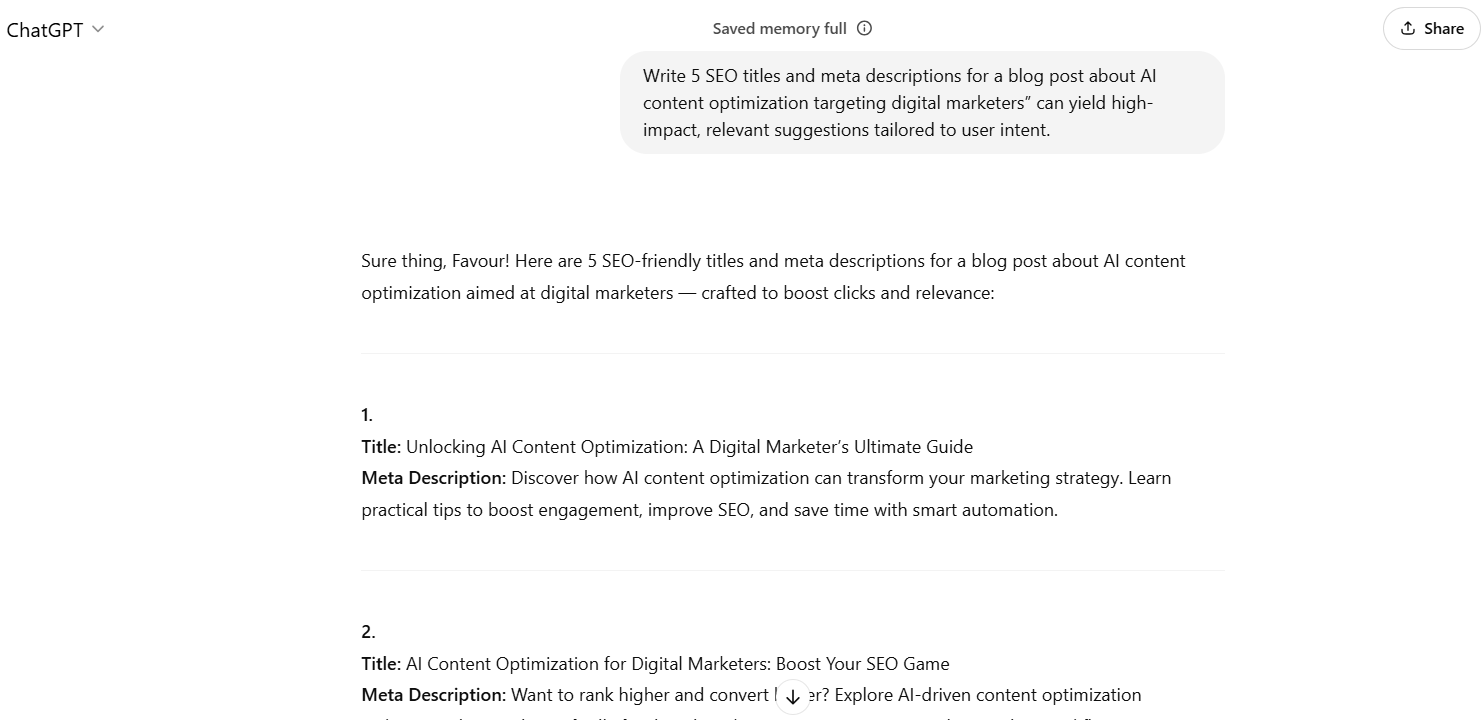
Nightwatch can analyze your competitors’ SERP presence, identify CTR trends, and reveal which titles and descriptions rank best.
You can use this data to test and refine your meta elements directly within your optimization workflow.
2. Identifying Secondary Keywords
Content optimized around just one keyword is limited in its effectiveness. AI SEO tools help you discover secondary keywords, semantic variations, and questions your audience is searching for.
So, head to the AI agent, select keyword research and ask it to suggest long-tail and semantically related keywords to your main topic.
Here’s a prompt you can use:
“Give me a list of LSI keywords related to email marketing suitable for SEO optimization. Please group them by intent (informational, transactional, navigational), and make sure they are relevant for a blog post in the SaaS industry.”
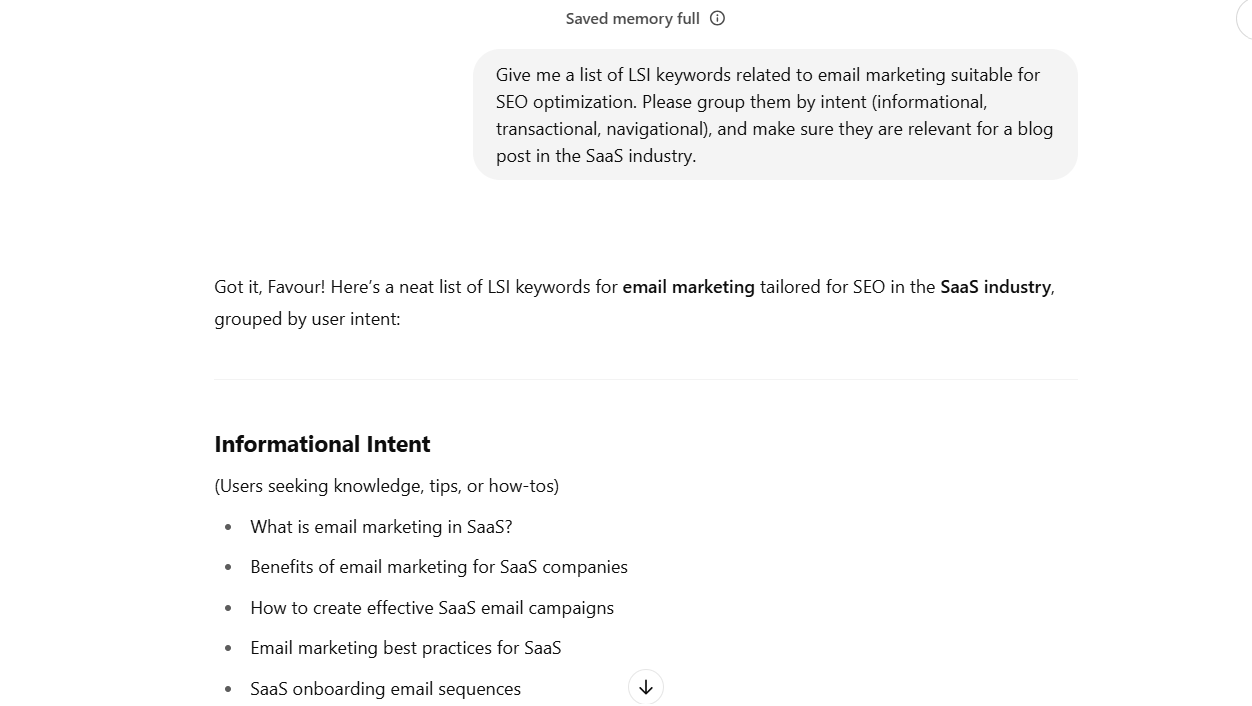
3. Conducting Keyword Research and Building Clusters for Strategic Topic Coverage
Keyword and topic clustering is essential for thematic depth and authority. It ensures your content isn’t siloed and that you’re targeting a range of related queries within the same content group.
First, generate a list of relevant keywords by prompting the AI agent. It will provide you with information on search volume, difficulty, and bid range.
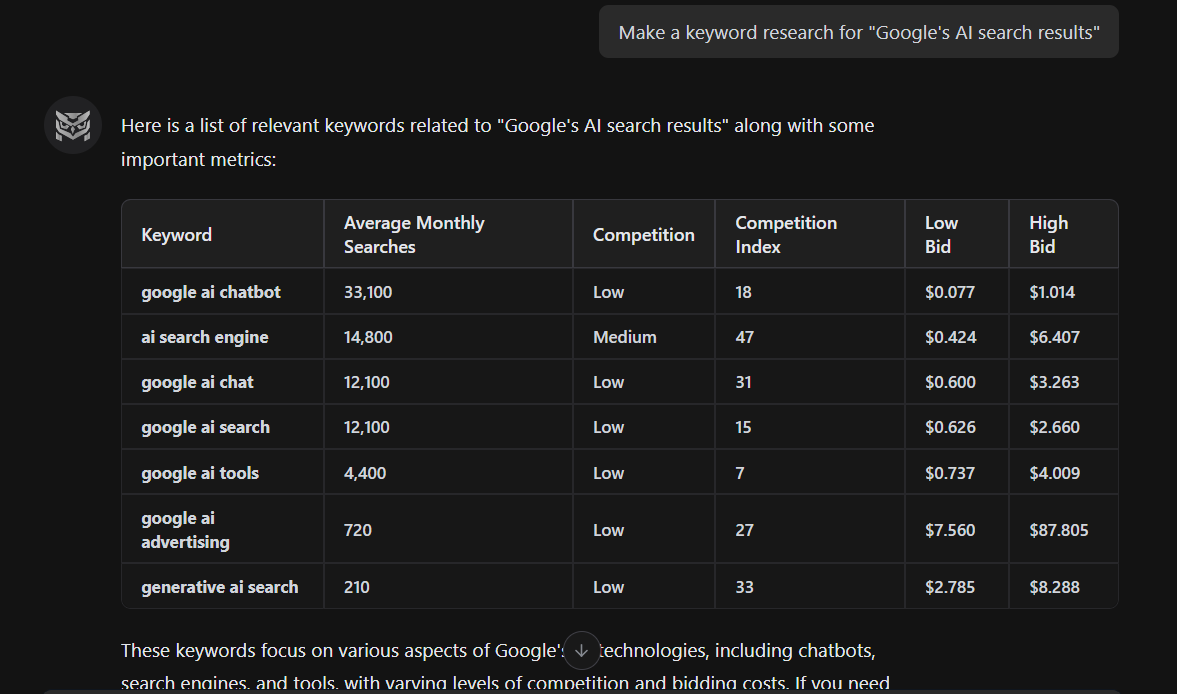
Once you have your keyword list, you can ask the AI agent or ChatGPT to help map out a content plan.
For instance:
“Create a content cluster strategy for the keyword ‘AI content optimization,’ including pillar topics and supporting articles.”
You’ll receive a roadmap that you can start executing immediately.
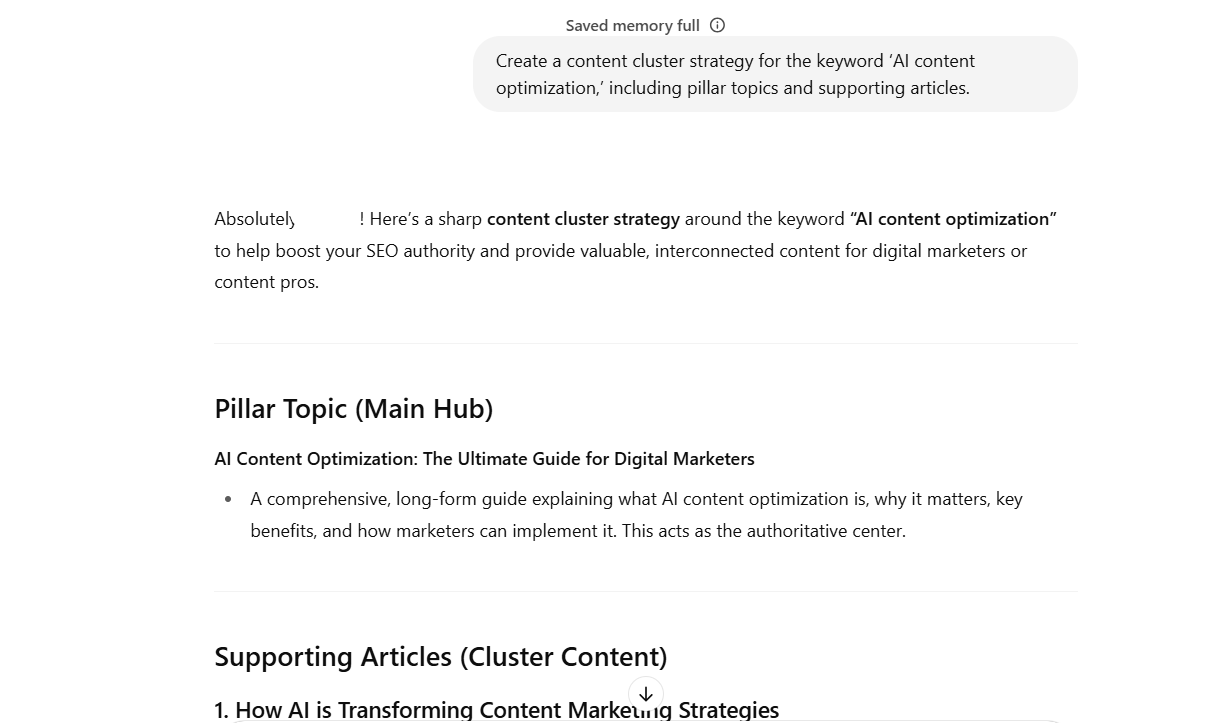
4. Finding Internal and External Linking Opportunities
Traditionally, internal linking can involve scouring your site or using search operators to filter through your content. External linking can even be more time-consuming, leading you down research rabbit holes or hours of subject matter interviews. But with AI, you can automate this.
Start by asking the agent to scan your content and suggest how you can naturally place internal links based on the topics mentioned. It can equally crawl your website and quickly pull up related articles that you can link to.
You can even paste snippets from multiple articles and receive AI-generated suggestions for effectively interlinking them.
And with ChatGPT or Perplexity AI, you can identify top-ranking pages in your niche and flag potential link partners or authority pages to cite in your content.
When working on my article about AI SEO tools, I hit a dead end with research material, but then Perplexity came through, uncovering data I wouldn’t have found on my own.
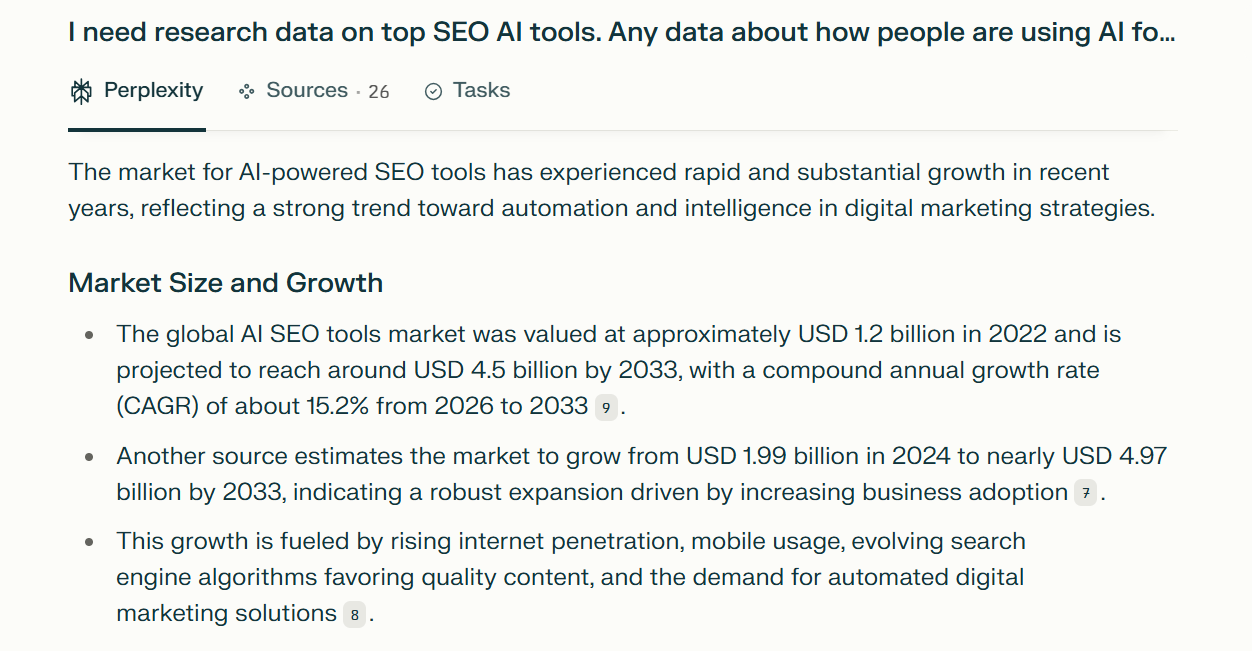
If you give this a try, you can stay aligned with Google’s E-E-A-T (Experience, Expertise, Authoritativeness, Trustworthiness) framework and craft truly relevant content that ranks above the rest.
5. Image Alt Text and Accessibility Optimization
Optimizing image alt text not only improves accessibility but can also support image SEO. But this is one area many marketers overlook.
Simply describe what the image shows and prompt ChatGPT to write accurate, concise, and SEO-friendly alt text.
Here’s an example prompt:
“Write descriptive alt text for an image showing a marketer using AI tools to optimize content on a laptop.”
And here’s the result:
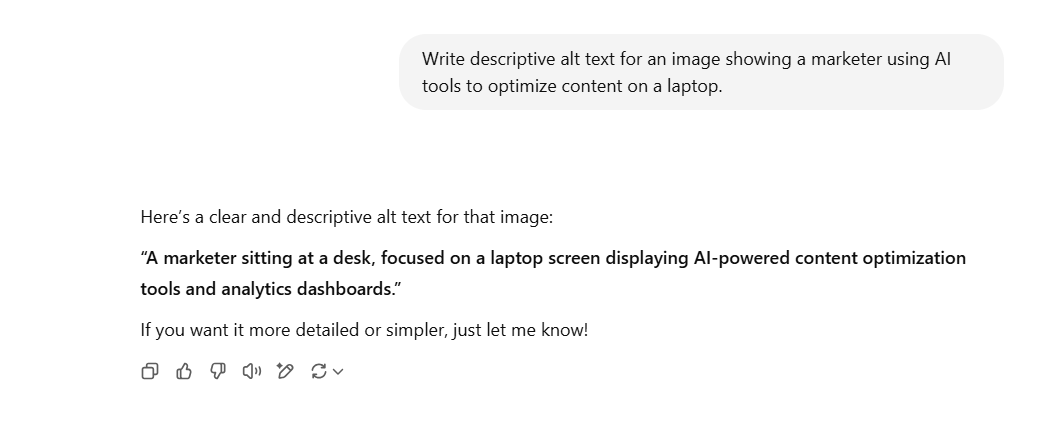
Nightwatch can also flag missing or under-optimized alt attributes during site audits, ensuring that every image contributes to your efforts.
6. Uncovering On-Page SEO Opportunities
On-page SEO encompasses a range of elements, including headings, keyword density, internal structure, and readability.
With the AI agent, you can scan your content and flag technical or content-related issues: missing H2s, duplicate tags, thin content, and more. It can even benchmark your content against top competitors for the same keyword.
Head to the agent, click on “Technical SEO,” and prompt it to crawl your pages for underperforming content that needs fixing.
These are some examples of prompts you can use:
“Crawl website nightwatch.io and show all pages with their h1 counts.”
“Crawl website nightwatch.io and show all pages where the title is missing.”
You can feed the audit findings into ChatGPT and ask for personalized optimization suggestions.
For example, you can feed the AI this prompt: “Based on this audit summary, how can I improve the SEO performance of this blog post?” And you’ll get a structured list of actionable tips.
7. Revealing Content Gaps and Missed Opportunities
Content gaps represent missed potential. AI tools can highlight topics you haven’t covered but your competitors have, allowing you to fill the void and boost your topical authority.
You can feed your content into ChatGPT or the SEO agent and ask it to mention sub-topics or angles you’ve overlooked.
A good prompt you can use is: “What topics are covered in these articles that mine doesn’t mention?”
8. Improving Content Clarity and Readability
Even the most SEO-rich content can fail if it’s not easy to read or understand. AI can help here, too.
Paste sections of your draft into ChatGPT and ask for a simpler, more readable rewrite.
You can even set your desired reading level, such as the 8th grade or college level. It will maintain your tone while increasing engagement. To further polish your copy, an AI humanizer can smooth out robotic phrasing and ensure your content sounds naturally written and reader-friendly.
9. Reviewing and Updating Existing Content
SEO is not a one-and-done game. Updating old content is just as important as creating new material.
With Nightwatch, you can track keyword ranking drops and traffic trends, which will highlight technical issues like broken links or outdated schema.
Once you know which posts need updating, ChatGPT can help improve your content by rewriting sections, adding new stats, or expanding ideas.
10. Drafting Effective Content Briefs and Outlines
Well-structured briefs and outlines are critical for maintaining content consistency and quality, especially when collaborating with a team.
Instead of spending hours crafting one yourself, you can let AI do this for you. Just ask ChatGPT to generate a content brief based on a target keyword, and it will include the recommended structure, headers, questions to answer, and even tone suggestions.
For this article, I asked ChatGPT to help with a detailed outline based on my target keyword, and it generated a comprehensive one complete with subheadings and the topics to cover.
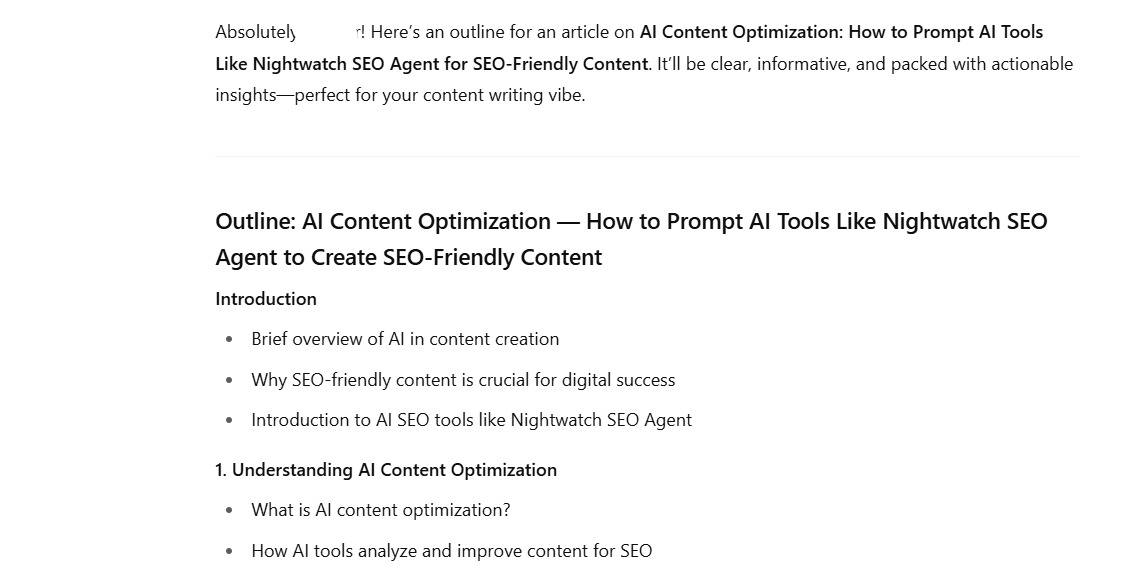
11. Creating Full-Length SEO Content from Scratch
When you combine Nightwatch’s keyword insights with ChatGPT, you get a content workflow that’s fast, efficient, and enjoyable.
Going from a blank page to a polished, publish-ready blog post has never been easier.
Here’s how to make the most of this combo:
-
Start with keyword research in Nightwatch: Look for a keyword cluster that’s backed by solid search volume and intent. This gives your content a smart starting point and ensures you’re targeting the right readers from the get-go.
-
Prompt the AI to generate content: The SEO agent can equally help you craft SEO-friendly content in minutes. Use a prompt like:
“Write a 2,000-word SEO blog post using this keyword cluster (include keywords). Structure it for easy reading and optimize it for strong on-page SEO. Include clear headings, subheadings, and natural keyword placement.”
You can also let ChatGPT handle the content writing with the same prompt, and in just a few moments, you’ll have a complete first draft.
-
Polish it up: Now it’s your turn. Refine the tone, add your unique voice, swap in some original insights, and make sure it sounds like you.
This step brings the personality and trust that AI can’t always replicate.
And just like that, you’ve got a well-structured, search-friendly, and genuinely valuable piece of content created in a fraction of the time.
Best Practices for Using AI for Content Optimization
While AI tools can dramatically streamline and enhance your SEO strategy, they’re most effective when used thoughtfully.
Relying solely on AI without human judgment can lead to generic, inaccurate, or misaligned content.
Below are essential best practices to help you maximize the value of AI while avoiding common pitfalls.
Always Pair AI Insights with Human Strategy
AI can provide valuable suggestions, but it doesn’t understand your brand voice, audience nuance, or market positioning as deeply as you do.
So, treat it as an intelligent assistant. Use tools like ChatGPT to brainstorm angles or create content, but add your expertise and personality.
Tip: Create content guidelines and brand voice documents. Then, feed them into ChatGPT to keep AI-generated content aligned with your brand tone.
Customize AI Prompts for Higher Relevance
If your AI-generated content feels flat, it’s often because the input was vague. AI works better when it’s given specific and detailed information on what to do.
Instead of “Write an article about SEO,” try:
“Write a 100-word introduction for a blog post titled ‘AI Content Optimization.’ The tone should be conversational, target SaaS marketers, and emphasize efficiency.”
You can take it even a step further and provide instructions on your preferred tone, your target audience, and the goal of your content:
Act as an expert SEO strategist and conversion-focused content writer. I need you to help me write a unique, high-quality, long-form blog post (around 3000 words) on the topic: (your target topic).
This article should be optimized for the target keyword and include relevant secondary keywords (your target keywords).
Target audience: (your target audience, e.g., Content marketers, SEO professionals, SaaS marketers).
Goal: (the goal of your content eg, to educate readers on the benefits of AI).
Style: Conversational, informative, and authoritative. Avoid fluff, keyword stuffing, and robotic tone.
Review, Fact-Check, and Edit AI Output
AI occasionally generates outdated or inaccurate information. Rather than rely on it solely, use ChatGPT as a first-draft machine or an idea generator.
- Fact-check any statistics, product names, or feature lists it produces.
- Use tools like Grammarly or Hemingway to polish readability, then do a final human edit for context and accuracy.
You can let AI handle time-consuming tasks like:
- Outlining articles
- Suggesting meta descriptions
- Summarizing key points
- Creating FAQ schemas
- Identifying content gaps
- Creating the first draft
While you can focus on refining content, incorporating storytelling, and originality.
Monitor SEO Impact Continuously
One thing to keep in mind is that AI tools themselves can’t tell you whether their changes are making a difference. They can suggest edits and optimizations, but without tracking your content’s performance, you won’t know if those updates are hitting the mark.
That’s why it’s crucial to use a rank tracking tool like Nightwatch to monitor what happens after you implement AI-driven changes.
Pay attention to key metrics:
- Are your rankings improving?
- Is the bounce rate dropping?
- Are sessions and conversions increasing?
These insights offer you honest feedback on whether your optimizations are effective or require further adjustments.
Frequently Asked Questions (FAQs)
Can AI be used for content optimization?
Yes, absolutely. AI can analyze, improve, and enhance various elements of your content to make it more SEO-friendly. AI content optimization involves using tools like Nightwatch and ChatGPT to refine your titles, meta descriptions, keywords, readability, internal linking, and more.
How do I use AI for SEO content?
You can use AI to support every stage of your SEO content process, from research and planning to execution and optimization. You can use ChatGPT to draft content outlines, write optimized blog posts, generate FAQs, and brainstorm topic ideas. Nightwatch’s AI SEO Agent excels at keyword research, clustering, and optimizing on-page elements, such as headings, links, and metadata.
Can AI help improve existing content?
Yes! AI is fantastic for auditing and enhancing your existing content. Tools like Nightwatch can identify where you’re missing internal links, secondary keywords, or optimization opportunities. Then, ChatGPT can help you rewrite paragraphs for clarity, expand sections, update outdated facts, or add relevant FAQs.
Will AI replace human SEO professionals?
Not likely. AI will assist SEO professionals, not replace them. It handles repetitive and data-heavy tasks, allowing marketers to focus on strategic thinking, creative storytelling, and relationship-building.
Tired of Manual SEO? Try AI Content Optimization
AI content optimization tools are automating the way content marketers, SEO professionals, and digital teams approach their workflows. What once took hours of manual research and guesswork can now be done in minutes.
You can quickly identify hidden content gaps, generate detailed content briefs, and even outline or draft entire articles, saving valuable time without sacrificing strategy.
But the real magic happens when you combine insights from tools like Nightwatch’s AI SEO agent with the creative capabilities of ChatGPT.
Together, they help you scale your content, maintain quality, and stay competitive without overexerting your team.
So, start integrating Nightwatch into your workflow today and unlock a faster, more strategic way to increase your content’s search visibility.
